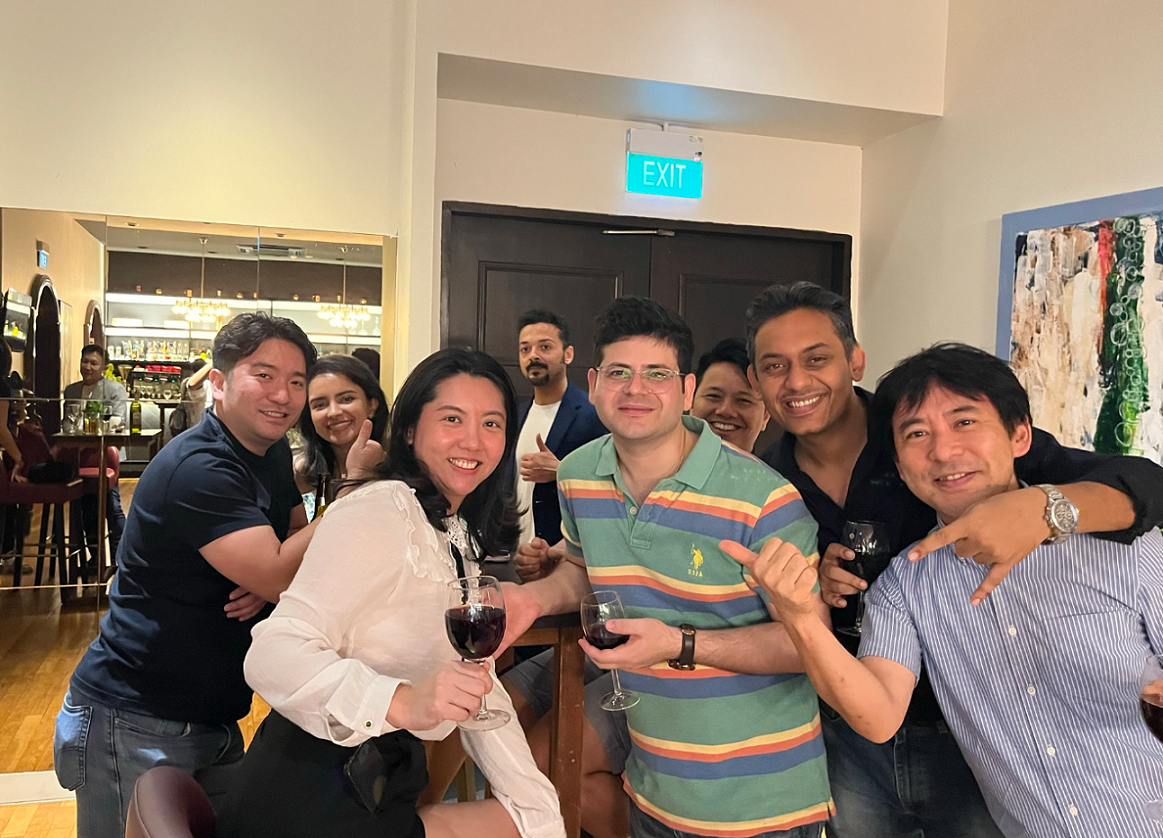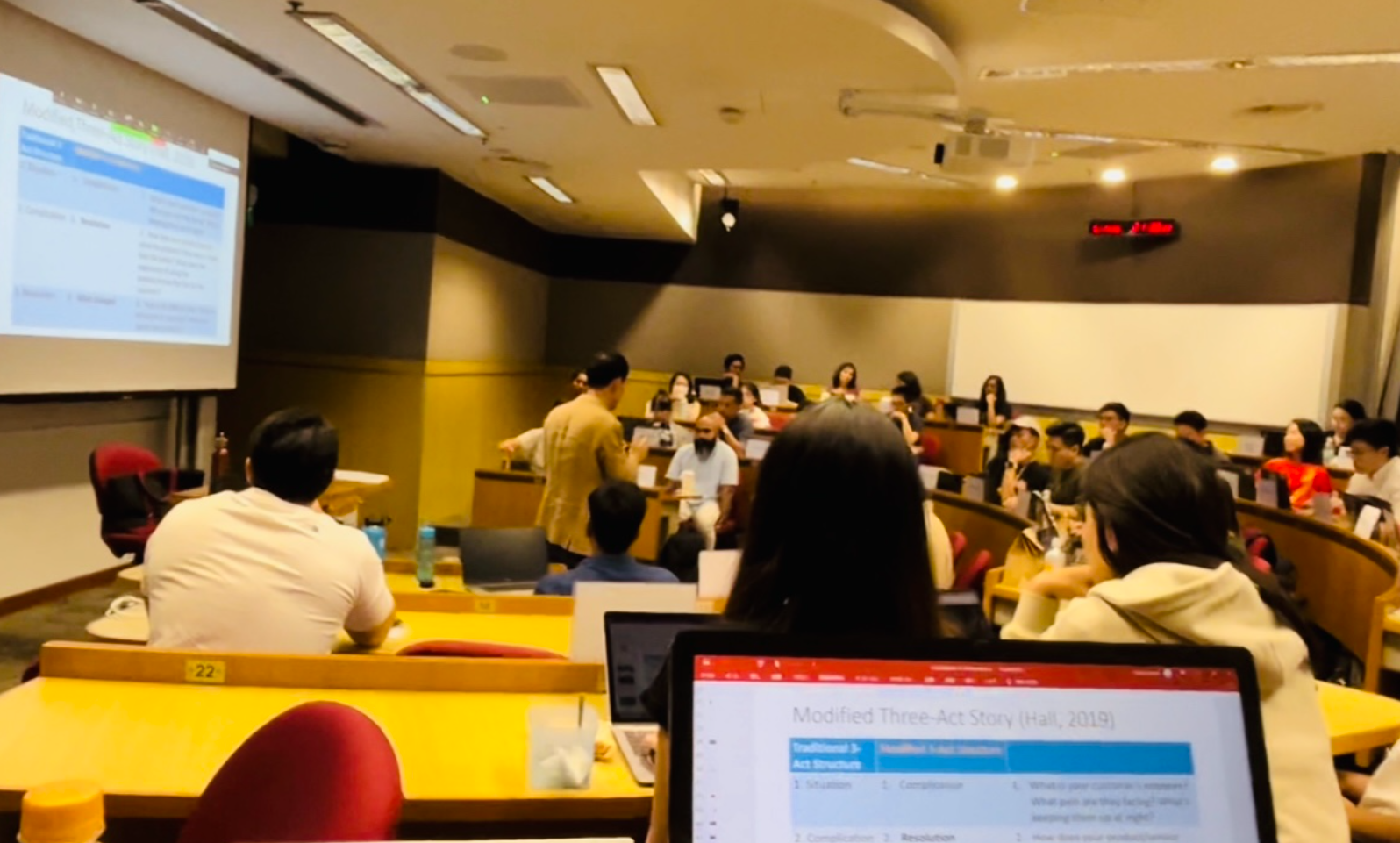Singapore Management University (Singapore)
Takara Zenno
Exchange Programs
July 2023 – December 2023
Tell us the reason why you decided to join the program.

Welcome cocktail party organized by SMU MBA Office (Author in the far right)
The primary reason for applying to the Exchange Program at SMU was to expand my academic and practical knowledges and better align with my future career objectives. My professional background includes fifteen years with a global grain trading company, where I was deeply involved in trading food materials like dairy powder and cacao products. This journey also took me to London and Singapore as an expat. Particularly in Singapore, I contributed to an international team, enhancing sales in Southeast Asian countries, and wanted to return to Singapore as an MBA student.
The decision to apply for the exchange program with SMU was driven by several factors.
First, I aimed to complement my studies and research at GSM with MBA courses at SMU, to better grasp Southeast Asian business practices through diverse case studies and interactions with lecturers and students from varied backgrounds. This also presented an opportunity to compare the MBA programs in Japan and Singapore.
Second, my research at GSM, focusing on the perception of Japanese food and services in the Southeast Asian market, made SMU an ideal location for further study and practical experience in this field.
Third, my aspiration to re-engage in business within the Southeast Asian market underpinned my belief that studying at SMU, a central hub in this region, would significantly benefit my career goals.
Lastly, the high reputation of SMU's MBA program, as endorsed by numerous former Singaporean colleagues, also played a crucial role in my decision to apply for this exchange opportunity.
The decision to apply for the exchange program with SMU was driven by several factors.
First, I aimed to complement my studies and research at GSM with MBA courses at SMU, to better grasp Southeast Asian business practices through diverse case studies and interactions with lecturers and students from varied backgrounds. This also presented an opportunity to compare the MBA programs in Japan and Singapore.
Second, my research at GSM, focusing on the perception of Japanese food and services in the Southeast Asian market, made SMU an ideal location for further study and practical experience in this field.
Third, my aspiration to re-engage in business within the Southeast Asian market underpinned my belief that studying at SMU, a central hub in this region, would significantly benefit my career goals.
Lastly, the high reputation of SMU's MBA program, as endorsed by numerous former Singaporean colleagues, also played a crucial role in my decision to apply for this exchange opportunity.
Tell us about the classes and research during your study abroad.

A Scene of Storytelling Lecture
Courses at SMU are quite intensive, with each session lasting 210 minutes, including a 30-minute break. One term comprises a total of 8 classes plus a 1-week test period. There is a 1-week break between terms. Given that the tuition fee for regular students is about 8 million yen per year, most students are earnestly studying, trying to recoup the investment made in their tuition fees.
Weekday courses are basically held from 19:15 to 22:45, taking working students into consideration. Many students attend classes directly after work and participate in them while eating light meals such as sandwiches. Some Saturday courses are held from 11:45 AM to 7:00 PM.
I took the following five courses. Most of these courses required fieldwork, interviews with companies or individuals, and extensive reading to prepare for individual reports and group presentations. During each class, we had to place name tents on our desks, and there was intense interaction between professors/lectures and students. Each of us was required to voice our opinions several times during the class.
- Digital Marketing Strategy
- Storytelling for Brands and Leaders
- Managing Innovation
- Design Thinking
- Entrepreneurship and Business Planning (As an Auditing student)
Some of the courses, such as Digital Marketing, Storytelling, and Design Thinking, were quite practical and required AI skills. This included learning how to use tools like Lexica, Eleven-Lab, Chat GPT and Runway to create dynamic presentations because SMU-MBA program understands that these skills are (or will be) indispensable in an actual business setting.
In terms of AI and Fintech, I found that the SMU MBA program is more advanced and offers various courses compared to Kyoto GSM, whereas Kyoto GSM has more ESG-related and academic focused courses.
Weekday courses are basically held from 19:15 to 22:45, taking working students into consideration. Many students attend classes directly after work and participate in them while eating light meals such as sandwiches. Some Saturday courses are held from 11:45 AM to 7:00 PM.
I took the following five courses. Most of these courses required fieldwork, interviews with companies or individuals, and extensive reading to prepare for individual reports and group presentations. During each class, we had to place name tents on our desks, and there was intense interaction between professors/lectures and students. Each of us was required to voice our opinions several times during the class.
- Digital Marketing Strategy
- Storytelling for Brands and Leaders
- Managing Innovation
- Design Thinking
- Entrepreneurship and Business Planning (As an Auditing student)
Some of the courses, such as Digital Marketing, Storytelling, and Design Thinking, were quite practical and required AI skills. This included learning how to use tools like Lexica, Eleven-Lab, Chat GPT and Runway to create dynamic presentations because SMU-MBA program understands that these skills are (or will be) indispensable in an actual business setting.
In terms of AI and Fintech, I found that the SMU MBA program is more advanced and offers various courses compared to Kyoto GSM, whereas Kyoto GSM has more ESG-related and academic focused courses.
Tell us about the school’s environment (Facilities, faculty and staff members, students, etc.).
Weather - Singapore has a tropical climate and it's consistently warm throughout the year. it's important to note that there are often temporary heavy rain showers for few hours.
Food - You can typically enjoy a wide variety of foods from around the world. Eating at restaurants can be very expensive for Japanese, but you can find budget-friendly options
(SGD8-10) at food courts or university canteens.
Transportation - Public transportation (MRT and buses) is well-organized and less expensive in Singapore. The car-hailing system, such as Grab, is also popular.
The environment around SMU - SMU is located in the CBD area and offers good access to many popular places/attractions/facilities including tourist spots.
How I spent my day-offs - I engaged in self-study at the library, participate in group work, dine-out with classmates, and sometimes travel to nearby countries such as Malaysia and Indonesia.
Food - You can typically enjoy a wide variety of foods from around the world. Eating at restaurants can be very expensive for Japanese, but you can find budget-friendly options
(SGD8-10) at food courts or university canteens.
Transportation - Public transportation (MRT and buses) is well-organized and less expensive in Singapore. The car-hailing system, such as Grab, is also popular.
The environment around SMU - SMU is located in the CBD area and offers good access to many popular places/attractions/facilities including tourist spots.
How I spent my day-offs - I engaged in self-study at the library, participate in group work, dine-out with classmates, and sometimes travel to nearby countries such as Malaysia and Indonesia.
Reflect your study abroad and tell us about your thoughts.
It feels like my 5-month MBA study abroad experience passed remarkably quickly but it was indeed fulfilling. While studying at SMU, I had the opportunity to take courses that were not offered at Kyoto University. This allowed me to deeply involve myself in the MBA program from a different perspective than my studies at Kyoto University, which was a great experience.
Through my study with various students from different backgrounds at the hub of SEA, I was able to broaden my network with my cohort and some of the lecturers which would surely become my asset for the rest of my life.
My study abroad experience would not have been successful without the strong support especially from my supervisors, and the GSM staff at Kyoto University, as well as Joann and Fiona at the SMU MBA office. I would like to express my gratitude once again to all who supported me.
Through my study with various students from different backgrounds at the hub of SEA, I was able to broaden my network with my cohort and some of the lecturers which would surely become my asset for the rest of my life.
My study abroad experience would not have been successful without the strong support especially from my supervisors, and the GSM staff at Kyoto University, as well as Joann and Fiona at the SMU MBA office. I would like to express my gratitude once again to all who supported me.
What kind of impact or changes has your experience of studying abroad given you? (Finding a job, future vision, point of view, etc.)
Although I had been working in Singapore for five+ years as an expatriate, through this study abroad experience in Singapore, I was able to gain a deeper understanding of Singapore, the business mindsets of people in Singapore and Southeast Asian countries, and the significance of working in this region. As I myself am considering going back to work in the SEA region, or at least doing a job related to the SEA business, this experience has already become a great asset for me. Some of the SMU MBA students, particularly those from the entrepreneurship course who are entrepreneurs themselves, have strongly motivated me to start my own business in the future as well. Studying with these students has surely broadened my way of thinking and changed how I will be involved in business for the rest of my life.
Please give some advice and message to the prospective students who are thinking of studying abroad.
I would like to highlight that GSM at Kyoto University offers a variety of programs beyond regular classes. If you try to take the initiative, the university provides substantial support. The exchange program is one of these opportunities. I understand there may be various time constraints, but as long as time and finances allow, I highly recommend participating in an exchange program.
(Kyoto University also offers a comprehensive scholarship package for study abroad.)
As some of you may feel that networking is one of the significant benefits of studying with peers at MBA program, and I believe this can be adequately achieved by studying at Kyoto University. By studying abroad, however, your network can expand even further, allowing you to absorb a variety of perspectives.
In addition to your current active involvement with Kyoto GSM program, studying at overseas MBA program for 1 or 2 semesters will surely be a great asset to your future career!
(Kyoto University also offers a comprehensive scholarship package for study abroad.)
As some of you may feel that networking is one of the significant benefits of studying with peers at MBA program, and I believe this can be adequately achieved by studying at Kyoto University. By studying abroad, however, your network can expand even further, allowing you to absorb a variety of perspectives.
In addition to your current active involvement with Kyoto GSM program, studying at overseas MBA program for 1 or 2 semesters will surely be a great asset to your future career!


